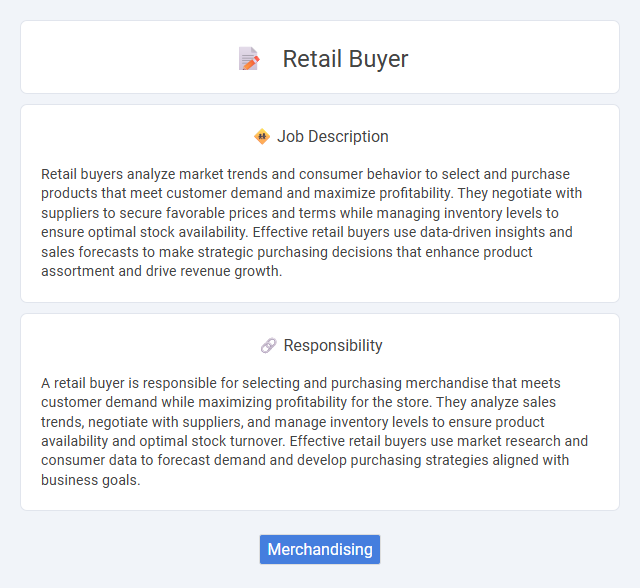
Retail buyers analyze market trends and consumer behavior to select and purchase products that meet customer demand and maximize profitability. They negotiate with suppliers to secure favorable prices and terms while managing inventory levels to ensure optimal stock availability. Effective retail buyers use data-driven insights and sales forecasts to make strategic purchasing decisions that enhance product assortment and drive revenue growth.
Individuals with strong analytical skills and a keen eye for market trends will likely be well-suited for a retail buyer role, as the job demands careful product selection and inventory management. Those who thrive in fast-paced environments and can make data-driven decisions under pressure may find this position aligns with their strengths. People who struggle with multitasking or lack interest in consumer behavior might face challenges adapting to the demands of the retail buying profession.
Qualification
Retail buyers typically require a bachelor's degree in business administration, marketing, or a related field, combined with strong analytical skills to evaluate market trends and consumer demand. Proficiency in inventory management software and negotiation abilities are essential for securing favorable deals with suppliers. Experience in retail, merchandising, or purchasing enhances decision-making accuracy and strategic planning capabilities.
Responsibility
A retail buyer is responsible for selecting and purchasing merchandise that meets customer demand while maximizing profitability for the store. They analyze sales trends, negotiate with suppliers, and manage inventory levels to ensure product availability and optimal stock turnover. Effective retail buyers use market research and consumer data to forecast demand and develop purchasing strategies aligned with business goals.
Benefit
A retail buyer likely benefits from gaining deep market insights and negotiating skills that can enhance product selection and profitability for their company. They probably experience opportunities for career growth and increased responsibility as they demonstrate success in managing supplier relationships and inventory. Access to trend forecasting and exclusive industry information may also provide them with a competitive edge in optimizing retail strategies.
Challenge
A retail buyer likely faces the challenge of accurately predicting consumer demand to avoid overstock or stockouts, which can directly impact profitability. Managing supplier relationships and negotiating favorable terms may present ongoing complexities requiring strategic skills. Furthermore, adapting to rapidly changing market trends and consumer preferences is probably a constant demand in this role.
Career Advancement
Retail buyers play a crucial role in selecting and purchasing merchandise that drives sales and profitability for retail companies, often leading to opportunities in senior purchasing or category management roles. Mastery in data analysis, market trends, and supplier negotiation can accelerate career growth toward positions such as buying manager, merchandising director, or procurement executive. Continuous professional development, including certifications in supply chain management and retail analytics, enhances advancement potential in the competitive retail industry.
Key Terms
Merchandising
Retail buyers specializing in merchandising analyze market trends and consumer demand to select and purchase products that maximize sales and profitability. They collaborate closely with suppliers and inventory managers to ensure optimal stock levels and product placement within stores. Effective retail buyers leverage data-driven insights and strategic sourcing to enhance product assortment and drive customer satisfaction.
 kuljobs.com
kuljobs.com